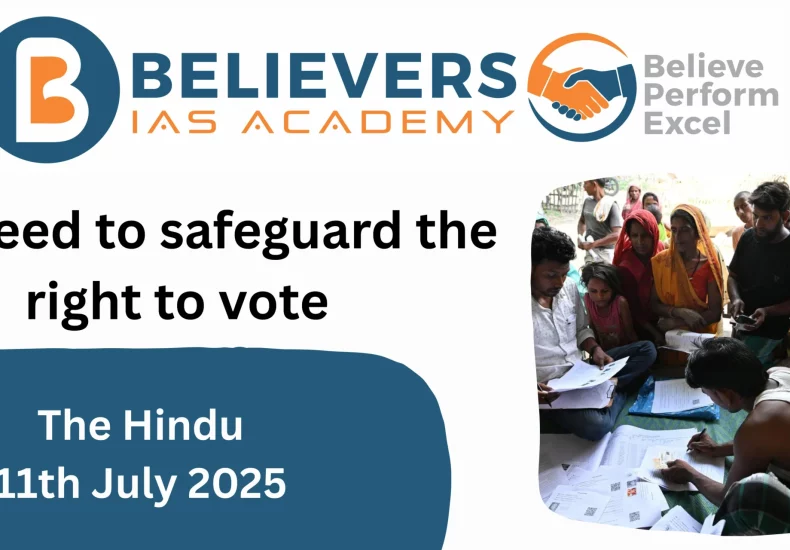Context: Supreme Courtroom on Electoral Roll Revision in Bihar
On July 10, 2025, the Supreme Courtroom directed the Election Fee (EC) to just accept Aadhaar, voter ID, and ration playing cards for the Particular Intensive Revision (SIR) of electoral rolls in Bihar. It careworn that the proper to vote is central to the functioning of India’s republic and deserves safety.
Common Grownup Suffrage: India’s Daring Democratic Selection
- India adopted common grownup suffrage (UAS) from the very starting, not like many Western democracies that step by step prolonged voting rights.
- Article 326 of the Structure grants voting rights to all residents aged 18+ (after the 61st Modification, 1989), no matter gender, caste, class, faith, schooling, or property.
- This democratic basis is supported by:
- Illustration of the Individuals Act (RPA), 1950 – for making ready electoral rolls.
- RPA, 1951 – for regulating elections and candidature.
Is the Proper to Vote a Basic Proper?
- Not a Basic Proper: The Supreme Courtroom in Kuldip Nayar v. Union of India (2006) held that the proper to vote is a statutory proper underneath Part 62 of RPA, 1951.
- Conflicting Opinions:
- Rajbala v. State of Haryana (2016) termed it a constitutional proper.
- Justice Ajay Rastogi (2023) dissented, linking voting to Article 19(1)(a) and Article 21, however this stays a minority opinion.
- Regardless of its authorized standing, courts acknowledge voting as a democratic crucial, important for consultant governance.
Why Electoral Roll Accuracy Issues?
- The “one particular person, one vote” precept depends on correct rolls.
- Errors resembling:
- Mass omissions
- Duplicate or ineligible names
- Incorrect entries
…may cause disenfranchisement or vote dilution.
- The EC’s authority underneath Part 21 of RPA, 1950 permits it to revise rolls.
- Nevertheless, solely systemic errors that materially have an effect on outcomes can invalidate elections.
🔍 SC’s intervention ensures inclusion with out compromising integrity.
Who Is an “Bizarre Resident”?
- Part 19 of RPA, 1950: A citizen 18+ years, who’s an “ordinarily resident” and not disqualified, can vote.
- Bizarre residence implies:
- Real, steady keep
- Not merely momentary or informal
- Instance: A scholar in a hostel might not qualify in the event that they intend to return elsewhere.
- Case regulation: Manmohan Singh (1991) clarified that ordinary, not nominal, residence determines eligibility.
Voting Past Cubicles: Postal Ballots and NRIs
- Rule 18, Conduct of Election Guidelines, 1961:
- Postal ballots for:
- Armed forces
- Paramilitary
- Authorities workers overseas
- Voters on election obligation
- Part 20A, RPA, 1950: NRIs can register however should vote in particular person (no postal/proxy voting).
- Postal ballots for:
Citizenship and the Voter Listing: Due Course of Important
- The Bihar SIR raised issues over citizenship verification and potential disenfranchisement.
- Lal Babu Hussein v. ERO (1995):
- SC struck down EC circulars that shifted the burden of proof of citizenship to people.
- Held that previous rolls, quasi-judicial procedures, and pure justice should information deletion.
- Rahim Ali (2024) reaffirmed that obscure suspicions can not justify voter exclusion.
⚖️ Due course of, not discretion, should govern roll revision.
Balancing Vigilance with Inclusion
- Voter inclusion and roll purification are usually not mutually unique.
- Political events, underneath the precept in Lakshmi Charan Sen v. A.Ok.M. Hassan Uzzaman (1985), should help in guaranteeing each inclusion of eligible and exclusion of ineligible
- The SC’s July 10 suggestion to develop acceptable ID paperwork is a pragmatic steadiness between safety and accessibility.
Conclusion: Defending the Proper to Elect
India’s democracy rests on:
- Correct, inclusive, and accessible electoral rolls
- Energetic citizen participation
- Vigilant establishments
- Clear authorized safeguards
“The precise to vote will not be elementary, however it’s foundational.”
Because the SC resumes listening to on July 28, the main focus should stay on empowering voters, guaranteeing procedural equity, and preserving belief in electoral democracy.


Leave a Reply